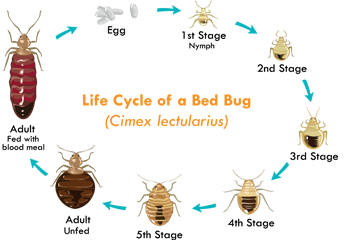Kings Exterminator Cincinnati: Effective Pest Management
Kings Exterminator Cincinnati: Effective Pest Management
Blog Article
A Failure of the Different Types of Pest Control Solutions
In the world of bug control, a wide range of methods exist to battle the existence and deal with of undesirable creatures. From the conventional usage of chemical pesticides to a lot more innovative organic control services, each approach offers distinctive advantages and constraints. As we navigate via the diverse landscape of pest control options, comprehending the intricacies of each technique becomes extremely important in identifying one of the most efficient training course of action. Keep tuned as we explore the nuanced globe of pest control approaches and discover exactly how each type plays a special duty in protecting our settings.
Chemical Pesticides
Chemical chemicals are generally used in insect control to successfully remove a wide variety of insects and other bugs. These chemicals function by targeting the nerve system of the parasites, disrupting their normal functions, and ultimately resulting in their demise. Making use of chemical pesticides has actually been a staple in the bug control sector for years as a result of their performance and fast outcomes.

Nevertheless, it is necessary to make use of chemical pesticides with caution as a result of their possible hazardous impacts on the atmosphere and non-target varieties. Incorrect application or overuse of these chemicals can result in air pollution, harm to valuable insects, and resistance advancement in pest populations. As a result, it is vital to comply with safety and security standards and policies when making use of chemical pesticides for insect control.
Biological Control Approaches
Considering the possible environmental impacts and risks connected with chemical pesticides, biological control techniques provide a more sustainable method to handling insect populations. Biological control involves using all-natural adversaries, such as killers, bloodsuckers, and microorganisms, to subdue bug populations. This method is often more targeted, influencing just the certain insect species while minimizing injury to valuable bugs, humans, and the environment.

Once established, natural enemies can help regulate pest populaces continuously without the need for duplicated applications of chemicals. In addition, organic control is commonly extra cost-efficient and can aid minimize chemical resistance in insect populations over time.

Mechanical Insect Control
Mechanical pest control entails the physical control or removal of parasites to manage their populaces successfully. This method is often utilized combined with various other insect control approaches for detailed pest control companies pest management. One common example of mechanical insect control is using traps to capture insects or rats. These traps can be established up in tactical areas where insects are recognized to dwell, helping to lower their numbers.
Another mechanical technique is making use of barriers such as fencings, internet, or displays to block bugs from entering particular areas. By physically stopping parasites from accessing a location, the probability of problems or damages can be considerably minimized. Additionally, hand-operated methods like handpicking insects off frameworks or plants can be reliable for smaller-scale problems.
While mechanical parasite control methods can be labor-intensive, they offer a non-chemical alternative that can be ecologically friendly and sustainable. By targeting pests directly, mechanical control techniques can help keep pest populations in check without relying on pesticides.
Natural Solutions
Utilizing all-natural solutions for pest control supplies a lasting and eco-friendly strategy to taking care of parasite populaces without considering chemical treatments. Natural remedies involve using materials originated from plants, minerals, or various other naturally occurring resources to hinder or get rid of insects. Planting certain natural herbs like basil, mint, or lavender around your residential property can push back bugs due to their solid fragrances. Diatomaceous earth, a powder made from fossilized algae, can be made use of to deal with insects like ants, roaches, and bed insects by dehydrating their exoskeletons.
Furthermore, essential oils such as tea tree oil or neem oil have insecticidal properties that can successfully regulate insects while being secure for the environment. One more all-natural remedy is introducing valuable insects like ladybugs or hoping mantises to your yard to take advantage of unsafe insects. By integrating these all-natural services right into parasite management techniques, individuals can minimize their dependence on artificial chemicals and promote a healthier, extra well balanced community.
Integrated Bug Monitoring
Integrated Pest Management (IPM) is a detailed strategy that combines various techniques to successfully regulate pest populaces while minimizing risks to human health and the atmosphere. IPM includes the combination of several bug control approaches such as organic control, environment adjustment, alteration of social techniques, and using immune plant selections. By making use of a mix of these methods, IPM intends to minimize reliance from this source on chemical pesticides, which can have unfavorable effects on environments and human health and wellness.
One secret element of IPM is the emphasis on prevention. By implementing measures to avoid pest problems prior to they happen, such as preserving appropriate sanitation and securing access factors, the requirement for reactive parasite control actions is lessened. Tracking and regular inspections play an important role in IPM, permitting very early detection of pest concerns and timely intervention.
Conclusion
In verdict, the various types of parasite control services use an array of options for successfully managing insect problems. Organic control methods use all-natural killers to control insects. Integrated Bug Monitoring combines multiple methods for an all natural approach to pest wasp control.
Chemical pesticides are frequently made use of in parasite control to effectively eliminate a large variety of pests and various other pests.Mechanical pest control involves the physical control or removal of bugs to handle their populaces properly (Kings pest control Cincinnati Ohio).Using all-natural treatments for insect control uses a lasting and environment-friendly technique to handling insect populations without resorting to chemical interventions.Integrated Pest Management (IPM) is a comprehensive approach that incorporates numerous methods to successfully manage pest populations while minimizing threats to human wellness and the atmosphere.In conclusion, the various kinds of bug control services provide a range of alternatives for successfully handling pest problems
Report this page